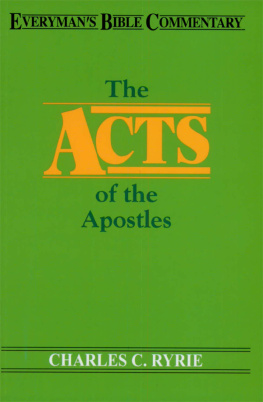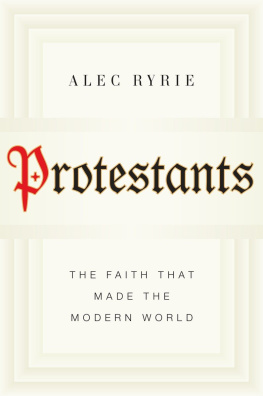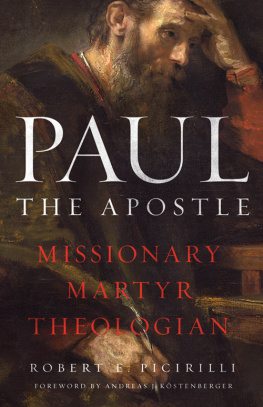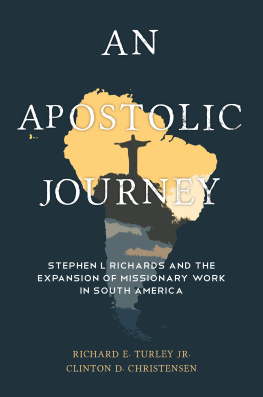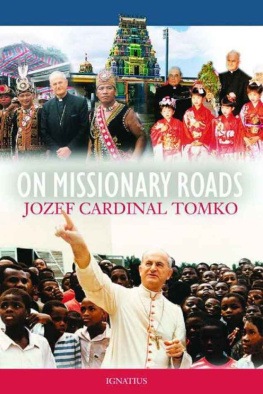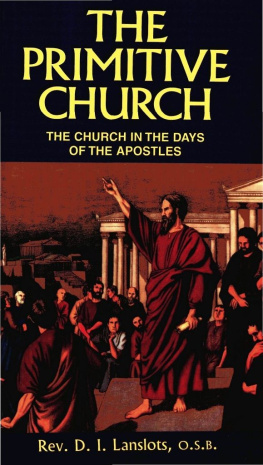All rights reserved. No part of this book may be reproduced in any form without permission in writing from the publisher, except in the case of brief quotations embodied in critical articles or reviews.
We hope you enjoy this book from Moody Publishers. Our goal is to provide high-quality, thought-provoking books and products that connect truth to your real needs and challenges. For more information on other books and products written and produced from a biblical perspective, go to www.moodypublishers.com or write to:
1
I. THE IMPORTANCE OF THE BOOK
T HE HISTORICAL IMPORTANCE of the Book of Acts is unquestioned. It is the chief source book for the facts concerning Christianity in the first century after Christ. But the book is also important doctrinally, for in it are the seeds of doctrines developed later in the epistles seeds which were nurtured in transformed lives. The doctrine of Acts is exemplified more in life than developed in systematic statement. It is doctrine in practice. Thus the book shows us what men can do in the power of the risen Saviour. It is the record of the continuation of those things which Jesus began to do while on earth and which He carries on as risen Head of the church (1:1). The book furnishes us the principles for revival and missionary work; it shows the divine pattern for church government; and it exhibits not only steadfastness but expansion under persecution. It is a book for the church in any century.
II. THE AUTHOR OF THE BOOK
Dr. Luke was evidently a Greek and not a Jew, for in Colossians 4:12-14 he is distinguished from those who are said to be of the circumcision. His place of birth is unknown to us, though Antioch in Syria and Philippi are often suggested. Of necessity he would have had to receive his medical training in one of the three universities of the day in Alexandria, Athens, or Tarsus. We know nothing of the circumstances of his conversion.
Although Luke is usually remembered as a physician, we should realize that he was primarily a missionary. His written ministry in the composition of the Gospel of Luke qualifies him as such, but he also did itinerant missionary work. The Macedonian call was answered by Luke as well as Paul (16:13, 17). He was in charge of the work at Philippi for approximately six years, and later he preached in Rome (Philem. 24). He was also with Paul during his second imprisonment in Rome (II Tim. 4:11).
III. THE DATE OF THE BOOK
Since the record in Acts concludes with Paul's arrival in Rome to begin his first confinement in that city, one would judge that the book was written about A.D. 63 in Rome during that first imprisonment. If it were written later it would be very difficult to explain why Luke did not mention such momentous events as the burning of Rome, the martyrdom of Paul, and the destruction of Jerusalem itself (particularly if it were written after A.D. 70).
IV. THE AUTHORSHIP OF THE BOOK
Briefly, the proof for the Lucan authorship of Acts is usually developed along three lines. (1) The author of Acts was clearly a companion of Paul. This is seen from the we sections of the book sections in which the first person plural is used signifying that the writer was a companion of Paul at those times (16:10-17; 20:521:18; 27:1 28:16). (2) By a process of elimination, that companion has to be Luke. The sections themselves eliminate, by mentioning, Silas, Timothy, Sopater, Aristarchus, Secundus, Gaius, Tychicus, and Trophimus; while the prison epistles point to Luke's being the companion (Col. 4:12; Philem. 24). (3) The same man who wrote the we sections wrote the remainder of the book, for the style is the same. (4) This conclusion that Luke was the author is substantiated by the incidence of medical terms found in Acts (1:3, 3:7 ff.; 9:18, 33; 13:11; 28:1-10).
V. THE SOURCES OF THE BOOK
Luke's statement concerning his method of research is found in Luke 1:1-4. Since his purpose in the writing of both the Gospel and the Acts was historical, and since his method was so careful, we may be assured that we have an accurate account of the events. In addition to all the care exercised by the author, the superintending work of the Holy Spirit guarantees the accuracy of the record which we have.
In producing his history of the apostolic age, Luke used several sources.
(1) Of some of the events he was a personal eyewitness. These are the we sections of the book; that is, sections in which Luke personally participated (16:10-17; 20:5-21:18; 27:1-28:31). These indicate that Luke was personally involved in the journey from Troas to Philippi (on the second missionary journey of Paul) and from Philippi (on the third journey) to Koine, including two years in Caesarea and two years in Rome. For all of these events he had his personal recollections and possibly diary-type written notes.
(2) Since Luke was with Paul during the five or six years before the writing of Acts, Paul could have provided him with information for the record in chapters 7, 9, 11:25-30, 13:1-16:8, and 17:1-20:4.
(3) Luke also had access to other eyewitnesses in gathering his material people like Silas, Timothy, Titus, Aristarchus, James, Philip and his daughters (19:29; 20:4; 21:8,18; Col. 4:10; Philem. 24).
After gathering his facts Luke declares that he closely traced all things accurately (Luke 1:3), which means that he sifted the facts before he wrote and that he made accurate use in his writing of those sifted facts. The physician's diagnostic skill was applied to the sifting of the source material in thorough preparation for writing an accurate historical account. And, of course, in all this work Luke was guided by the Holy Spirit of God so that the Acts is that exact historical record correct in every detail which God wanted us to have.
2
Acts 1:1-26
I T HAS OFTEN been said that the title of the Acts of the Apostles ought to be the Acts of the Risen Lord. The idea for such a change comes from the introduction to this first chapter (vv. 1-3). The former treatise (the Gospel of Luke) which Dr. Luke wrote to Theophilus (apparently a noble convert to Christianity) had recorded the things which Jesus began to do while in His body of limitation. The present treatise (Acts) continued the record of the works of Jesus, only in His resurrection body in which He was seen by the apostles for forty days (v. 3). Three acts of this risen Lord are recorded in this chapter.
I. THE RISEN LORD CORRECTING, 1:4-7
A. Correction concerning Service, 4-5
In His conversations with His disciples during the forty day post-resurrection ministry, the Lord spoke concerning the kingdom of God. Apparently the disciples had become greatly enthused, and so the Lord cautioned them to wait in Jerusalem for the coming of the Holy Spirit before they began their service for Him. The ministry of the Spirit was not unknown to them; indeed they had experienced it (Jn. 14:17; 20:22). But the baptizing work of the Spirit was something they had not yet experienced, for the Lord said, Ye shall be baptized with the Holy Ghost not many days hence (v. 5). Then they would be ready for service. (And, of course, after the promise had been received there would be no more need for tarrying.)

